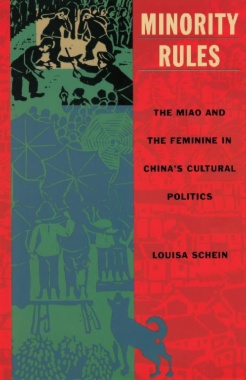Minority Rules is an ethnography of a Chinese people known as the Miao, a group long consigned to the remote highlands and considered backward by other Chinese. Now the nation’s fifth largest minority, the Miao number nearly eight million people speaking various dialects and spread out over seven provinces. In a theoretically innovative work that combines methods from both anthropology and cultural studies, Louisa Schein examines the ways Miao ethnicity is constructed and reworked by the state, by non-state elites, and by the Miao themselves, all in the context of China’s postsocialist reforms and its increasing exchange and fascination with the West. She offers eloquently argued interventions into debates over nationalism, ethnic subjectivity, and the ethnography of the state.
Posing questions about gender, cultural politics, and identity, Schein examines how non-Miao people help to create Miao ethnicity by depicting them as both feminized keepers of Chinese tradition and as exotic others against which dominant groups can assert their own modernity. In representing and consuming aspects of their own culture, Miao distance themselves from the idea that they are less than modern. Thus, Schein explains, everyday practices, village rituals, journalistic encounters, and tourism events are not just moments of cultural production but also performances of modernity through which others are made primitive. Schein finds that these moments frequently highlight internal differences among the Miao and demonstrates how not only minorities but more generally peasants and women offer a valuable key to understanding China as it renegotiates its place in the global order.
- Contents
- Illustrations
- Preface and Acknowledgments
- Chapter 1. Introduction
- Part I. Nation/Representation
- Chapter 2. Of Origins and Ethnonyms: Contested Histories, Productive Ethnologies
- Chapter 3. Making Minzu: The State, the Category, and the Work
- Chapter 4. Internal Orientalism: Gender and the Popularization of China's Others
- Chapter 5. Reconfiguring the Dominant
- Part II. Identity and Cultural Struggle
- Chapter 6. Songs for Sale: Spectacle from Mao to Market
- Chapter 7. Scribes, Sartorial Acts, and the State: Calling Culture Back
- Chapter 8. Displacing Subalternity: The Mobile Other
- Chapter 9. Performances of Minzu Modernity
- Chapter 10. Conclusion
- Notes
- Bibliography
- Index

